 Charlie Chaplin: The Mutual Films Collection (Limited Edition Blu-ray box set) | Blu Ray | (25/05/2015)
from £25.65
| Saving you £4.34 (16.92%)
| RRP
Charlie Chaplin: The Mutual Films Collection (Limited Edition Blu-ray box set) | Blu Ray | (25/05/2015)
from £25.65
| Saving you £4.34 (16.92%)
| RRP Charlie Chaplin entered the film industry in 1914 and by 1916 was the highest paid entertainer in the world after signing a contract with the Mutual Film Corporation for a salary of $670 000. Mutual built Chaplin his very own studio and allowed him total freedom to make 12 two-reel films during a 12-month period which have been brought together for the first time on this two-disc boxset. Chaplin subsequently recognised this period of film-making as the most inventive and liberating of his career. These twelve films demonstrate the breadth of Chaplin’s abilities as both a physical slapstick actor and a subtle endearing character actor. The collection includes the slapstick custard pie fights of Behind the Screen and his first minor masterpiece The Vagabond where he successfully combines pathos and comedy to create a lyrical love story. This limited edition collection of Chaplin films has been fully restored and features music by acclaimed silent film composer Carl Davis. Bonus Features: 12 films (1916-1917) with Carl Davis scores all presented in full High Definition: The Floorwalker The Fireman The Vagabond One AM The Count The Pawnshop Behind the Screen The Rink Easy Street The Cure The Immigrant The Adventurer Alternative scores for each film by a range of composers Audio commentaries for selected films Newsreel shorts: Chaplin Signs the Mutual Contract (1916 30 secs); Charlie on the Ocean (1921 5 mins) Carl Davis interview (9 mins) Extensive booklet with essays and full film credits
 Modern Times - Charlie Chaplin DVD | DVD | (24/08/2015)
from £N/A
| Saving you £N/A (N/A%)
| RRP
Modern Times - Charlie Chaplin DVD | DVD | (24/08/2015)
from £N/A
| Saving you £N/A (N/A%)
| RRP The Little Tramp experiences the dull, dispiriting rigmarole of the modern world as he gets caught up in the sprockets and cogs of modern industrialisation and, subjected to the factory's infernal production rate, starts to go mad. The only saving grace appears in the form of a beautiful orphaned gamine whom he helps escape from the police.
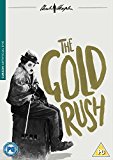 The Gold Rush - Charlie Chaplin DVD | DVD | (10/08/2015)
from £N/A
| Saving you £N/A (N/A%)
| RRP
The Gold Rush - Charlie Chaplin DVD | DVD | (10/08/2015)
from £N/A
| Saving you £N/A (N/A%)
| RRP A prospector goes to the Klondike in search of gold and finds it and more.
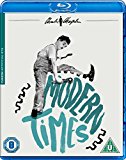 Modern Times - Charlie Chaplin Blu-ray | Blu Ray | (24/08/2015)
from £N/A
| Saving you £N/A (N/A%)
| RRP
Modern Times - Charlie Chaplin Blu-ray | Blu Ray | (24/08/2015)
from £N/A
| Saving you £N/A (N/A%)
| RRP The Little Tramp experiences the dull, dispiriting rigmarole of the modern world as he gets caught up in the sprockets and cogs of modern industrial- isation and, subjected to the factory's infernal production rate, starts to go mad. The only saving grace appears in the form of a beautiful orphaned gamine whom he helps escape from the police.
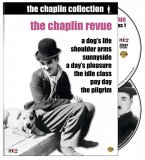 Chaplin Revue | DVD | (15/08/2005)
from £N/A
| Saving you £N/A (N/A%)
| RRP
Chaplin Revue | DVD | (15/08/2005)
from £N/A
| Saving you £N/A (N/A%)
| RRP That Charles Chaplin's Little Fellow (his own name for the Little Tramp) is such a Comic Everyman enabled the master moviemaker to place the character in all manner of situations. That versatility abounds in this treasure chest of seven marvelous movies made for First National between 1918 and 1923. Included are such touchstones as Shoulder Arms (his popular portrayal of World War I trench life) The Idle Class (skewering the rich) and The Pilgrim (lampooning smal
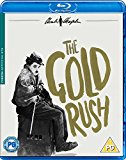 The Gold Rush - Charlie Chaplin Blu-ray | Blu Ray | (14/09/2015)
from £N/A
| Saving you £N/A (N/A%)
| RRP
The Gold Rush - Charlie Chaplin Blu-ray | Blu Ray | (14/09/2015)
from £N/A
| Saving you £N/A (N/A%)
| RRP The Gold Rush saw the highly anticipated return of the Little Tramp to the silver screen as he seeks his fortune in the hidden gold mines of Klondike. This logical ambition quickly becomes surreal, however, when another prospector, just as famished as he, begins mistaking the Little Tramp for a giant chicken. In this world where shoelaces become spaghetti and bread rolls become ballet shoes, Chaplin, the alchemist, turns gold into visual poetry...
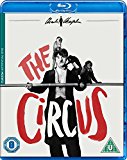 The Circus - Charlie Chaplin Blu-ray | Blu Ray | (10/08/2015)
from £N/A
| Saving you £N/A (N/A%)
| RRP
The Circus - Charlie Chaplin Blu-ray | Blu Ray | (10/08/2015)
from £N/A
| Saving you £N/A (N/A%)
| RRP When we first meet Chaplin's Tramp in this comic gem, he's broke and hungry. Mistaken for a pickpocket and pursued by a police officer into a circus tent, the Tramp becomes a star when delighted patrons think his escape from the law is an act. Highlights include a frenetic fun-house seqeunce, the Tramp turning a magical skit into mayhem and his teetering tighrope walk while monkeys cling to his head.
![Charlie Chaplin Complete Box Set [1921]](/pictures/1012273.jpg) Charlie Chaplin Complete Box Set | DVD | (22/09/2003)
from £N/A
| Saving you £N/A (N/A%)
| RRP
Charlie Chaplin Complete Box Set | DVD | (22/09/2003)
from £N/A
| Saving you £N/A (N/A%)
| RRP This Chaplin Collection DVD box set contains the following films, also available separately: The Kid (1921), The Gold Rush (1925), The Circus (1928), City Lights (1931), Modern Times (1936), The Great Dictator (1940), Monsieur Verdoux (1947) and Limelight (1952). Full details can be found in our Chaplin Collection feature. There are also two films exclusive to this box set: A Woman of Paris (1923) and A King in New York (1957), plus the documentary Charlie: The Life and Art of Charles Chaplin--see DVD Description below.
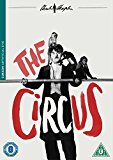 The Circus - Charlie Chaplin DVD | DVD | (10/08/2015)
from £8.29
| Saving you £7.70 (48.20%)
| RRP
The Circus - Charlie Chaplin DVD | DVD | (10/08/2015)
from £8.29
| Saving you £7.70 (48.20%)
| RRP When we first meet Chaplin's Tramp in this comic gem, he's broke and hungry. Mistaken for a pickpocket and pursued by a police officer into a circus tent, the Tramp becomes a star when delighted patrons think his escape from the law is an act. Highlights include a frenetic fun-house seqeunce, the Tramp turning a magical skit into mayhem and his teetering tighrope walk while monkeys cling to his head.
![Modern Times (Chaplin Collection) [DVD]](/pictures/1105510.jpg) Modern Times (Chaplin Collection) | DVD | (14/02/2011)
from £N/A
| Saving you £N/A (N/A%)
| RRP
Modern Times (Chaplin Collection) | DVD | (14/02/2011)
from £N/A
| Saving you £N/A (N/A%)
| RRP In Modern Times one of Charles Chaplin's most popular films The Tramp struggles to live in a modern industrial society with the help of a young homeless woman. played by Paulette Goddard. The film is both the last of The Tramp films and the last silent film Chaplin made and is another masterful mix of drama social comment and wonderful comedy.
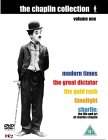 Chaplin Classics Vol 1 | DVD | (22/09/2003)
from £N/A
| Saving you £N/A (N/A%)
| RRP
Chaplin Classics Vol 1 | DVD | (22/09/2003)
from £N/A
| Saving you £N/A (N/A%)
| RRP Modern Times: In this delightfully madcap comedy Chaplin plays a hapless factory worker who cracks under the strain of his job and runs amok. Unemployed on the streets of Depression America he joins forces with a young woman fleeing the childcare authorities and they embark on a misadventure-filled search for happiness. The Great Dictator: Tomanian dictator Adenoid Hynkel has a double a poor Jewish barber who one day is mistaken for Hynkel and comic catastrophes ensue! Gold Rush: The Tramp goes to the Klondike in search of gold and finds a whole lot more! Limelight: Fading comedian Calvero (Chaplin) and suicidally despondent ballet dancer Thereza (Bloom) look to each other to find meaning and hope in their lives... Charlie: The Life And Art Of Charles Chaplin: Richard Schickel's new documentary Charlie chronicles Charles Chaplin's brilliant career as an actor writer director producer and composer as well as his controversial and much publicised private life - his love affairs and four marriages his paternity suit scandal and persecution by the FBI culminating in a self-imposed exile from the United States. With its brilliant observations rare footage interwoven with scenes from Chaplin's greatest films and a remarkable series of newly recorded interviews Charlie is the definitive documentary overview of Chaplin and his Little Tramp.
![Modern Times - Dual Format Edition [Blu-ray] [1936]](/pictures/1101723.jpg) Modern Times - Dual Format Edition | Blu Ray | (23/08/2010)
from £22.99
| Saving you £-3.00 (-15.00%)
| RRP
Modern Times - Dual Format Edition | Blu Ray | (23/08/2010)
from £22.99
| Saving you £-3.00 (-15.00%)
| RRP In Modern Times one of Charles Chaplin's most popular films The Tramp struggles to live in a modern industrial society with the help of a young homeless woman. This Dual Format Edition (Blu-ray and DVD) includes the 1936 feature which has now been restored in high definition.
![Charlie Chaplin Marathon - The Rink, The Immigrant, Tillie's Punctured Romance, The Vagabond [1914]](/pictures/1013340.jpg) Charlie Chaplin Marathon - The Rink, The Immigrant, Tillie's Punctured Romance, The Vagabond | DVD | (01/11/1999)
from £11.83
| Saving you £-4.58 (N/A%)
| RRP
Charlie Chaplin Marathon - The Rink, The Immigrant, Tillie's Punctured Romance, The Vagabond | DVD | (01/11/1999)
from £11.83
| Saving you £-4.58 (N/A%)
| RRP “The Rink”: Chaplin plays a waiter who spends his time at the skating rink where his skill and grace lead to possible romance and unfortunate mishaps. “The Immigrant”: En-route by boat immigrant Chaplin tries to make the best of the rough seas. He befriends a woman and appoints himself her protector. “Tillie’s Punctured Romance”: This is the first feature-length comedy ever made and features Chaplin as a con artist who talks Marie Dressler an innocent lass into taking her dad’s savings and running off to the city with him. “The Vagabond”: This is the story of The Little Tramp a pathetic fiddler that makes a scanty living and rescues damsels in distress. One of the first films directed by Charlie Chaplin.
![Charlie Chaplin Marathon - Vol. 2 - A Dog's Life / The Kid / Behind The Screen [1918]](/pictures/1013181.jpg) Charlie Chaplin Marathon - Vol. 2 - A Dog's Life / The Kid / Behind The Screen | DVD | (09/02/2001)
from £N/A
| Saving you £N/A (N/A%)
| RRP
Charlie Chaplin Marathon - Vol. 2 - A Dog's Life / The Kid / Behind The Screen | DVD | (09/02/2001)
from £N/A
| Saving you £N/A (N/A%)
| RRP Featuring 'A Dogs Life' and 'The Kid' and 'Behind The Screen'.
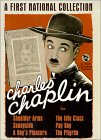 Charles Chaplin: A First National Collection | DVD | (14/03/2000)
from £N/A
| Saving you £N/A (N/A%)
| RRP
Charles Chaplin: A First National Collection | DVD | (14/03/2000)
from £N/A
| Saving you £N/A (N/A%)
| RRP ![Charlie Chaplin - Gold Rush [1925]](/pictures/1012277.jpg) Charlie Chaplin - Gold Rush | DVD | (22/09/2003)
from £N/A
| Saving you £N/A (N/A%)
| RRP
Charlie Chaplin - Gold Rush | DVD | (22/09/2003)
from £N/A
| Saving you £N/A (N/A%)
| RRP Chaplin's personal favourite among his own films, The Gold Rush embodies all the trademarks of his mix of slapstick, satire, social commentary and sentiment--a perfect showcase for his ever-popular Little Tramp. Set during the Klondike Gold Rush in 1898, the film features a comic reworking of the gruesome Donner Party story, where a group of snowbound immigrants resorted to eating their clothes and then each other to stay alive. It opens with a grand shot of gold prospectors snaking up the side of a mountain. We then see the Tramp, typically estranged from the rest of the group, making his own way across the snow. Seeking shelter in a blizzard, he finds the cabin of the dangerous criminal Black Larson (Tom Murray) and when another prospector, Big Jim McKay (Mack Swain), comes along, the two of them take charge of the cabin and eventually drive him out. Starving on Thanksgiving, the pair decide to dine in style when the Tramp cooks one of his shoes, famously acting as if he's cooking a fine piece of meat; twirling the laces up like spaghetti and savouring every last nibble. When he finally escapes, the Tramp ends up in a local town and falls in love, only to be rebuffed on New Year's Eve. When a chance meeting reunites him with Big Jim, the two go back in search of gold hidden near the cabin. Despite its unlikely origins, the story is shaped into a classic comedy containing many famous set-pieces, including the cabin teetering on the edge of a cliff and the Tramp morphing into a chicken before the starving Big Jim. Ultimately it's Chaplin's endearing and amusing persona that makes this material genuinely enduring. On the DVD The Gold Rush comes to DVD in a decent transfer with good mono sound and the option of Dolby Digital 5.1. The second disc of bonus features opens with an introduction by David Robinson, who chronicles Chaplin's work on the film, which was interrupted when his clandestine affair with his 15-year-old leading lady meant that, due to her becoming pregnant, the filming had to close for a few months while a new female lead was found. The original 1925 version of the film, before Chaplin updated it with the addition of sound in 1942, appears in full. The Chaplin Today documentary illustrates the influence of the film on director Idrissa Ouedraogo from Burkina Faso, whose own work follows similar themes, as well as going behind the scenes on the original production. Trailers, posters and stills round off this worthy addition to the Chaplin Collection. --Laura Bushell
![Charlie Chaplin - Modern Times [1936]](/pictures/1012282.jpg) Charlie Chaplin - Modern Times | DVD | (01/06/2006)
from £N/A
| Saving you £N/A (N/A%)
| RRP
Charlie Chaplin - Modern Times | DVD | (01/06/2006)
from £N/A
| Saving you £N/A (N/A%)
| RRP Modern Times marks the last proper appearance of Charles Chaplin's iconic Little Tramp, and finds our hero struggling to make ends meet in the Depression of the 1930s. Along the way he takes up with a juvenile delinquent (actually 24-year-old Paulette Goddard) and plays a prison incident with "nose powder" for drug-induced laughs--both plot elements seeming quite innocent here, though both would provoke controversy today. Modern Times' most famous sequences portray the dehumanisation of factory labour to fine comic effect, balancing satire with slapstick to perfection in several superbly executed set-pieces. While the film has sound-effects and musical score, speech is only presented through mechanical means, via a gramophone, or through wall-sized TVs far more futuristic than in those in HG Wells' Things to Come (also 1936)--it's an interesting footnote that the comic and the SF visionary were friends. Chaplin famously not being a fan of sound cinema acknowledges the need to move with the times, yet hilariously spoofs the exploitation of man and machine while doing so. Amid some great laughs, the political message comes though clearly: the boss is making a fortune while doing jigsaw puzzles in his luxury office, the workers are toiling ever harder on the production line for their pittance. On the DVD: Modern Times is offered in the original 4:3 black and white with good mono sound evidencing just a little distortion and a very clean, clear picture with minimal grain to give away its age. Also included are French and Italian dubbed versions and a pointless and ineffective English Dolby Digital 5.1 version of the soundtrack. The disc features multiple subtitle options, including English for hard of hearing. Disc Two begins with a six-minute introduction by David Robinson. Next comes a very worthwhile 26-minute documentary by Philippe Truffault, Chaplin Today, centred around a perceptive subtitled discussion between French filmmakers Luc & Jean-Pierre Dardenne. There are three trailers, beautifully reproduced posters, an eight-part photo gallery and one entertaining deleted scene, as well as Chaplin's "nonsense song" from the film in isolated form and in a "Karaoke" version. The Documents section begins with a silent 42-minute 1931 documentary/propaganda film, In the Machine Age made by the US Dept of Labor. Along similar but more entertaining lines is Symphony in F a 1940 colour film combining music, manufacturing footage and animation celebrating the Ford motor company, while also included is a sequence from the Liberace Show (1956) with the star performing the vocal version of "Smile", the theme from Modern Times. Demonstrating the truly universal appeal of Chaplin is a 1967 short For the First Time, documenting what happens when the people of the remote Baracoa mountains in Cuba see their first ever movie, Modern Times. This is a remarkable collection which does a great film justice. --Gary S Dalkin
![Charlie Chaplin - Modern Times [1936]](/pictures/1012153.jpg) Charlie Chaplin - Modern Times | DVD | (17/11/2003)
from £N/A
| Saving you £N/A (N/A%)
| RRP
Charlie Chaplin - Modern Times | DVD | (17/11/2003)
from £N/A
| Saving you £N/A (N/A%)
| RRP Chaplin's last 'silent' film filled with sound effects was made when everyone else was making talkies. Charlie turns against modern society the machine age (the use of sound in films?) and progress. Firstly we see him frantically trying to keep up with a production line tightening bolts. He is selected for an experiment with an automatic feeding machine but various mishaps leads his boss to believe he has gone mad and Charlie is sent to a mental hospital... When he gets out he is mistaken for a communist while waving a red flag sent to jail foils a jailbreak and is let out again. We follow Charlie through many more escapades before the film is out.
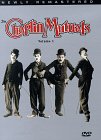 Chaplin Mutuals, Vol. 1 | DVD | (19/11/1997)
from £N/A
| Saving you £N/A (N/A%)
| RRP
Chaplin Mutuals, Vol. 1 | DVD | (19/11/1997)
from £N/A
| Saving you £N/A (N/A%)
| RRP ![Charlie Chaplin - Vol. 10 [1916]](/pictures/1012638.jpg) Charlie Chaplin - Vol. 10 | DVD | (27/01/2003)
from £5.99
| Saving you £18.00 (300.50%)
| RRP
Charlie Chaplin - Vol. 10 | DVD | (27/01/2003)
from £5.99
| Saving you £18.00 (300.50%)
| RRP Featuring the Chaplin shorts: The Pawn Shop (1916) / The Floorwalker (1916) / The Rink (1916) / The Count (1916)

Please wait. Loading...
This site uses cookies.
More details in our privacy policy